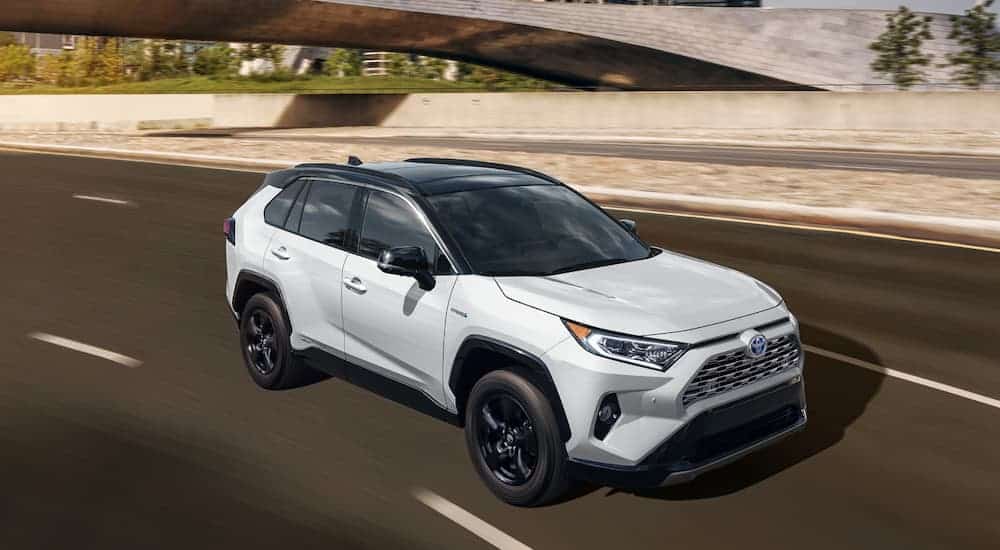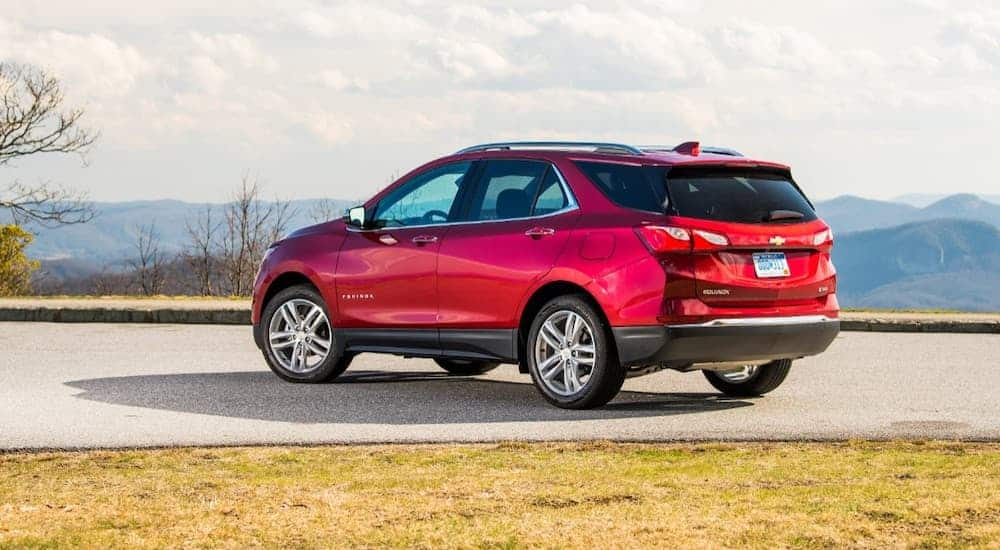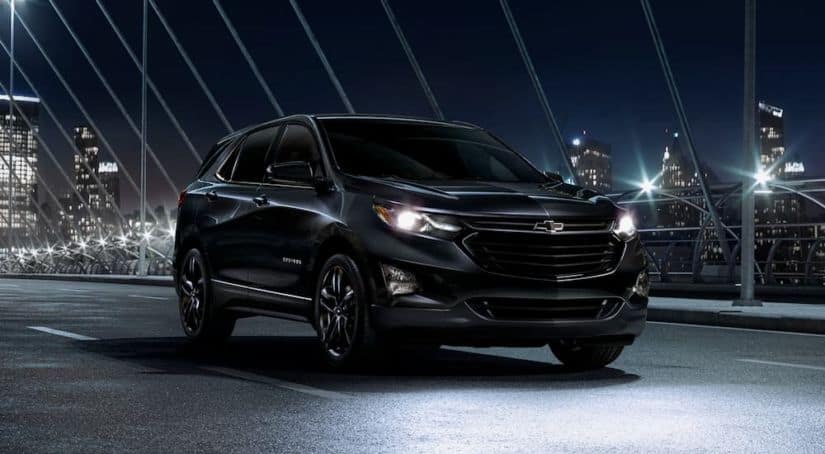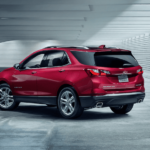There is a lot that drivers have come to expect of the compact SUV. Not only are these vehicles expected to be small, lightweight, and built with a sense of fuel conservation in mind, drivers also demand that they pack a powerful punch beneath the hood, have some serious capabilities, and offer a spread of automotive tech that transforms the way they drive. To put it bluntly, it is a tall order to live up to. That said, of all the automakers in the industry attempting to design the latest and greatest compact SUV, both Toyota and Chevy do a pretty considerable job at rising to the occasion. On the one hand is the 2020 Chevy Equinox, a compact SUV inspired by full-size classics like the Suburban and the Tahoe, yet still developed with a sense of downsized practicality in mind. On the other hand, is the 2020 Toyota RAV4, a compact SUV from an automaker that specializes in small, lightweight, and futuristic designs. While both of these compact SUVs are certainly top contenders, we’d be remised if we didn’t attempt to see the results of a comparison of the 2020 Chevy Equinox vs 2020 Toyota RAV4.
Looks Aren’t Everything
Exterior appearance matters a great deal when it comes to compact SUVs, especially as competitor automakers become less and less creative in their designs. In the field of compact SUVs, vehicles are beginning to blend together in terms of appearance. Both the 2020 Chevy Equinox and the 2020 Toyota RAV4 fall victim to this scenario in some capacity, but both attempts to break the mold with some interesting choices made throughout.
Take Toyota’s contender for instance. In the past, the Toyota RAV4 was a clear example of how compact SUVs are beginning to look more and more similar. The 2020 model has broken this tradition, however. Measuring in at 181” in length, and 73” in width, the Toyota RAV4 doesn’t break the scales in terms of size. Although, the sloping front end design and clear attention to aesthetic detail make for a compact SUV that doesn’t quite look compact. Although, Toyota has made some polarizing choices here that some SUV classics may not appreciate. Regardless, the Toyota RAV4 is a sprawling package, with a dizzying ten different trim options to choose from, some of which are driven by Toyota’s famous hybrid powertrains. Starting pricing is also quite the deal, with drivers being able to spend as little as $25,850 to get behind the wheel of the base model.
How does the 2020 Chevy Equinox compare? Well, the Chevy Equinox is no small fry, answering the demand for compact SUV diversity with a chassis that is, in many ways, pulled directly from the Chevy full-size models. Imagine a vehicle like the Chevy Suburban or the Chevy Tahoe but pulled down to a more manageable size. Although, that’s not to say the Chevy Equinox is small, as this compact SUV still measures in at a whopping 73” wide, and 183” in length. Getting behind the wheel of a Chevy Equinox is about $2,050 cheaper than it is in the Toyota RAV4, pricing in at around $23,800 MSRP for most base L models. And if you want to upgrade to the LS, LT, or Premier, it isn’t too much of a costly upgrade.
While the Toyota RAV4 does add far more choice than the Chevy Equinox, choice isn’t the only way we define the value of a compact SUV. For many drivers, it is the suite of machinery beneath the hood that really makes or breaks a potential SUV.

The Tools at Your Disposal
Toyota has never been known for developing particularly powerful vehicles. Operating with an appeal for fuel conservation and excellent onboard technology, adept powertrains have never quite been their cup of tea. That said, the Toyota RAV4 does offer its fair share of engine capability in the form of a fairly consistent 203 horsepower 2.5-liter four-cylinder engine that puts out around 184 lb-ft of torque. It’s not a scale breaking engine build by any means, but it gets the job done.
Unfortunately, if you’re looking for a beefier model, you won’t necessarily find it. Sure, the Hybrid drivetrains do offer a 219 horsepower combined fuel and electric system, but that’s about as powerful as things get. Off the bat, you do get front-wheel drive, and a direct-shift 8-speed automatic transmission, but it is hardly the kind of game-changing performance we were hoping for. You can upgrade the Toyota RAV4 in the TRD Off-Road trim to sport more robust equipment, like all-wheel drive and a better-equipped transmission, but it’s not going to compete with off-road juggernauts like the Jeep Renegade or Wrangler.
Chevy, on the other hand, has garnered quite the reputation for a diverse set of engines, all of which deliver in terms of driving experience; the 2020 Chevy Equinox is no different. Base models of the Chevy Equinox start remarkably strong with a punchy 1.5-liter turbocharged four-cylinder engine that makes 170 horsepower and 203 lb-ft worth of torque without breaking much of a sweat. The accompanying 6-speed automatic transmission does a solid job at keeping up as well, and while you’ll be getting front-wheel drive, handling in the base model is pretty consistent throughout.
What’s great about the Chevy Equinox is that this is just the baseline. Upgrade all the way up to the Limited for instance, and you can get a 2.0-liter turbocharged four-cylinder that puts out 252 horsepower and 260 lb-ft worth of torque. You can also expect rugged all-wheel drive, and a bigger and snappier 9-speed automatic transmission.
While the Chevy Equinox vastly outpaces the Toyota RAV4 in terms of performance, it does fall short by not offering a hybrid model. There is also the fact that even at max power, the Chevy Equinox and the Toyota RAV4 can tow similar payloads, topping out at 3,500 lbs. So, depending on what you’re looking for, the extra robust power of the Chevy Equinox may not look quite as bright as the hybrid options of the Toyota RAV4.

Reviewing the Finer Details
No matter how you spin it, these are both great SUVs, but which one you buy really depends on what you’re in the market for. For instance, the Toyota RAV4 fits the typical Toyota expectation by packing a slew of active safety features into each model. These are features that most automakers only offer at a premium price and include things like Road Sign Assistance, Lane Departure Alerts, Full-Speed Range Dynamic Radar Cruise Control, Blind Spot Monitors, and both Front and Rear Parking Assist. The Chevy Equinox does compare in some capacity, offering things like Front Pedestrian Braking, Forward Collision Alerts, and Automatic Emergency Braking as standard. However, if you’re looking for Chevy’s full safety package, you’ll have to invest a bit more money to keep up with the layout offered by Toyota.
So, which vehicle is the superior choice? Well, at the end of the day, it all depends on your preference. Are you looking for something with more powertrain options? Or do you prefer to spend less at the pump and would rather drive a hybrid? Answering these questions can go a long way in determining which is the better compact SUV, as no matter which way you spin it, both the Chevy Equinox and the Toyota RAV4 truly deliver a valuable package across every trim level.



